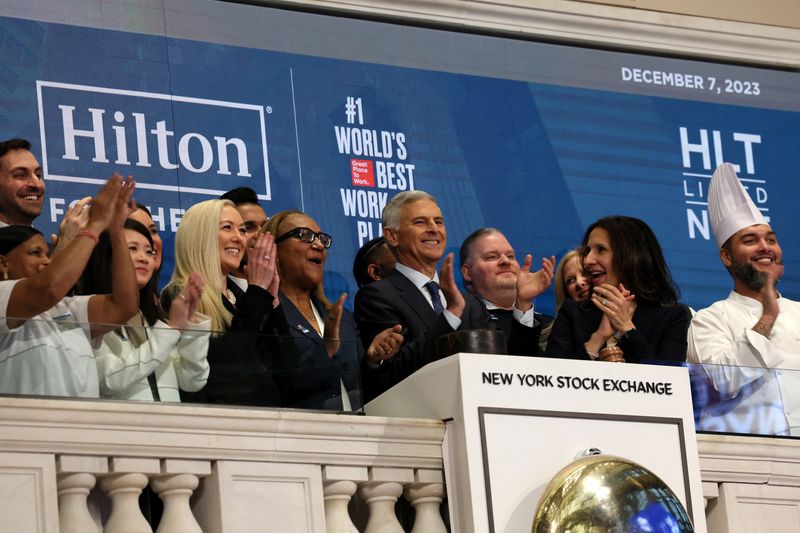By Aishwarya Jain and Doyinsola Oladipo
(Reuters) -Hilton Worldwide Holdings beat Wall Street estimates for first-quarter revenue and raised its 2024 profit forecast on Wednesday, banking on rebounding international and group travel and its expanding hotel portfolio to boost results.
International travel demand is expected to continue to recover this year as global air connectivity increases and travelers flock to Middle Eastern and Latin American destinations for vacation, even as demand for domestic travel plateaus in North America.
Hilton's shares were up 5.5% in early trading.
The company forecast annual adjusted profit of between $6.89 and $7.03 per share, up from the previous range of $6.80 to $6.94 per share.
Its first-quarter revenue rose 12% to $2.57 billion, beating analysts' expectations of $2.53 billion, according to LSEG data. Management and franchise fee revenues rose 14.4% year-over-year.
Hilton, which owns brands such as Waldorf Astoria Hotels & Resorts, reported a quarterly revenue per available room (RevPAR) - an important metric in the hospitality industry - of $104.16, lifted by higher occupancy and room rates.
"System-wide RevPAR increased 2.0 percent, which was at the low end of our guidance range, as renovations, inclement weather and unfavorable holiday shifts weighed on performance more than anticipated," CEO Christopher Nassetta said on an analyst call.
RevPAR rose 14.8% in the Middle East and Africa during the quarter, higher than any other region. It fell 0.4% in the U.S. and was flat in China, as travelers in those regions opted to travel abroad.
"US RevPAR turned negative but Americas and Middle East & Africa accelerated ... implying global travel demand still robust," Richard Clarke, an analyst at Bernstein, wrote in a note.
Hilton's quarterly adjusted profit was $1.53 per share, ahead of analysts' estimate of $1.42 per share.
It expects net unit growth, or room additions, to be between 6% and 6.5% in 2024, excluding the effect of its planned Graduate Hotels acquisition, which is expected to close in the second quarter. Quarterly net unit growth was 5.6%.

Contract acquisition costs and capital expenditures in 2024, excluding amounts reimbursed by third parties, are projected between $250 million and $300 million, Hilton said.
William Crow, analyst at Raymond James, said the U.S. RevPAR decline might help brace the Street for what's to come for peers, especially those with smaller global footprints than Hilton, Marriott or Hyatt.